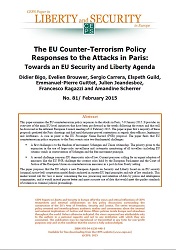№ 81 THE EU COUNTER-TERRORISM POLICY. Responses to the Attacks in Paris
№ 81 THE EU COUNTER-TERRORISM POLICY. Responses to the Attacks in Paris
Author(s): Didier Bigo, Evelien Brouwer, Sergio Carrera, Elspeth Guild, Emmanuel-Pierre Guittet, Julien Jeandesboz, Francesco Ragazzi, Amandine Scherrer, Felix Scherrer
Subject(s): Politics / Political Sciences, Politics, Law, Constitution, Jurisprudence, Criminal Law, Security and defense, Penal Policy
Published by: CEPS Centre for European Policy Studies
Keywords: terrorism: counter-terrorism;
Summary/Abstract: This paper examines the EU counterterrorism policy responses to the attacks in Paris, 7-9 January 2015. It provides an overview of the main EU-level initiatives that have been put forward in the weeks following the events and that will be discussed in the informal European Council meeting of 12 February 2015. The paper argues that a majority of these proposals predated the Paris shootings and had until that point proved contentious as regards their efficacy, legitimacy and lawfulness. A case in point is the EU Passenger Name Record (PNR) proposal. The paper finds that EU counterterrorism policy responses to the Paris events raise two fundamental challenges: ** A first challenge is to the freedom of movement, Schengen and Union citizenship. The priority given to the expansion in the use of large-scale surveillance and systematic monitoring of all travellers including EU citizens stands in contravention of Schengen and the free movement principle. ** A second challenge concerns EU democratic rule of law. Current pressures calling for an urgent adoption of measures like the EU PNR challenge the scrutiny roles held by the European Parliament and the Court of Justice of the European Union on counterterrorism measures in a post-Lisbon Treaty setting. // The paper proposes that the EU adopts a new European Agenda on Security and Liberty based on an EU security (criminal justice-led) cooperation model firmly anchored in current EU legal principles and rule of law standards. This model would call for ‘less is more’ concerning the use, processing and retention of data by police and intelligence communities, and it would instead pursue better and more accurate use of data that would meet the quality standards of evidence in criminal judicial proceedings.
Series: CEPS Papers in LIBERTY and SECURITY in Europe
- Print-ISBN-13: 978-94-6138-448-5
- Page Count: 21
- Publication Year: 2015
- Language: English
- eBook-PDF

